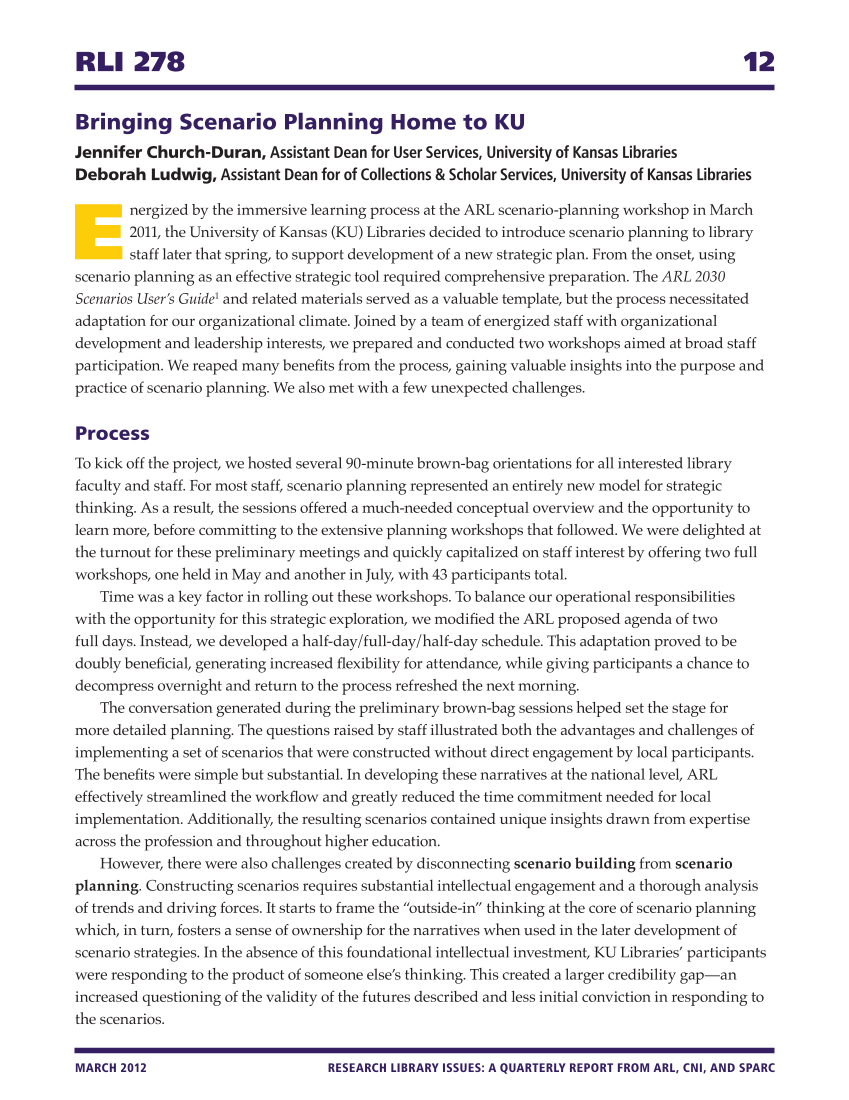RLI 278 12 March 2012R esearch Library Issues: A Quarterly Report from ARL, CNI, and SPARCarc Bringing Scenario Planning Home to KU Jennifer Church-Duran, Assistant Dean for User Services, University of Kansas Libraries Deborah Ludwig, Assistant Dean for of Collections & Scholar Services, University of Kansas Libraries E nergized by the immersive learning process at the ARL scenario-planning workshop in March 2011, the University of Kansas (KU) Libraries decided to introduce scenario planning to library staff later that spring, to support development of a new strategic plan. From the onset, using scenario planning as an effective strategic tool required comprehensive preparation. The ARL 2030 Scenarios User’s Guide1 and related materials served as a valuable template, but the process necessitated adaptation for our organizational climate. Joined by a team of energized staff with organizational development and leadership interests, we prepared and conducted two workshops aimed at broad staff participation. We reaped many benefits from the process, gaining valuable insights into the purpose and practice of scenario planning. We also met with a few unexpected challenges. Process To kick off the project, we hosted several 90-minute brown-bag orientations for all interested library faculty and staff. For most staff, scenario planning represented an entirely new model for strategic thinking. As a result, the sessions offered a much-needed conceptual overview and the opportunity to learn more, before committing to the extensive planning workshops that followed. We were delighted at the turnout for these preliminary meetings and quickly capitalized on staff interest by offering two full workshops, one held in May and another in July, with 43 participants total. Time was a key factor in rolling out these workshops. To balance our operational responsibilities with the opportunity for this strategic exploration, we modified the ARL proposed agenda of two full days. Instead, we developed a half-day/full-day/half-day schedule. This adaptation proved to be doubly beneficial, generating increased flexibility for attendance, while giving participants a chance to decompress overnight and return to the process refreshed the next morning. The conversation generated during the preliminary brown-bag sessions helped set the stage for more detailed planning. The questions raised by staff illustrated both the advantages and challenges of implementing a set of scenarios that were constructed without direct engagement by local participants. The benefits were simple but substantial. In developing these narratives at the national level, ARL effectively streamlined the workflow and greatly reduced the time commitment needed for local implementation. Additionally, the resulting scenarios contained unique insights drawn from expertise across the profession and throughout higher education. However, there were also challenges created by disconnecting scenario building from scenario planning. Constructing scenarios requires substantial intellectual engagement and a thorough analysis of trends and driving forces. It starts to frame the “outside-in” thinking at the core of scenario planning which, in turn, fosters a sense of ownership for the narratives when used in the later development of scenario strategies. In the absence of this foundational intellectual investment, KU Libraries’ participants were responding to the product of someone else’s thinking. This created a larger credibility gap—an increased questioning of the validity of the futures described and less initial conviction in responding to the scenarios.
























